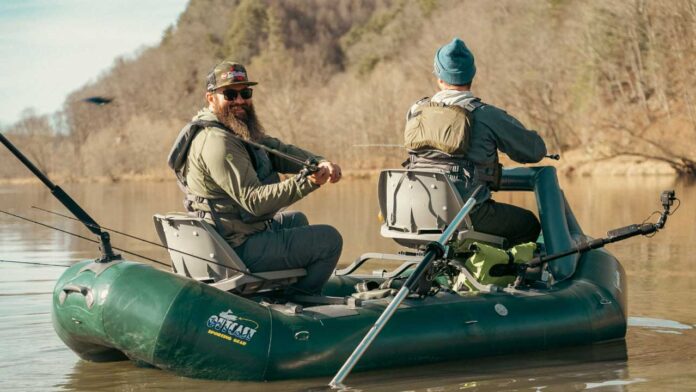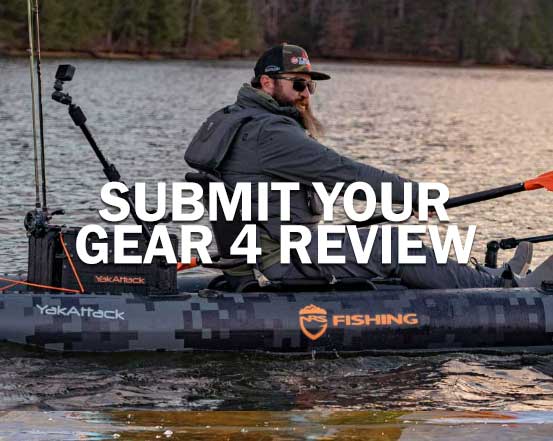I recently bought and tested one of Outcast Sporting Gear’s Striker fishing rafts. In this article I share my thoughts with this Outcast Stricker fishing raft review.
I have also done another review of a similar fishing raft. Check out my NRS Slipstream 96 Review Fishing Raft and I break down the differences in a comparison video of the Outcast Striker vs NRS Slipstream 96.
The Striker was designed to be packed down quickly and transported to and from the water easily. It was also built to accommodate two anglers comfortably. I was anxious to check it out because I’ve been looking for a two-person raft for some time.
Setting up the Outcast Striker
I bought the boat from Ed’s Fly Shop, but the box was pretty beat up by the time it got to me. Thankfully, nothing inside was damaged and I was able to put the boat together myself pretty quickly. However, there were a few missing parts.
I emailed Ed’s on Saturday and followed that up with a phone call, and by Monday Outcast had shipped what I needed. So despite the shipping issues, I got top-notch customer service from both Ed’s and Outcast.
If you're thinking about one of these rafts after reading this review, be sure to check out Ed's Fly Shop because I never would have been able to test the boat without their help.
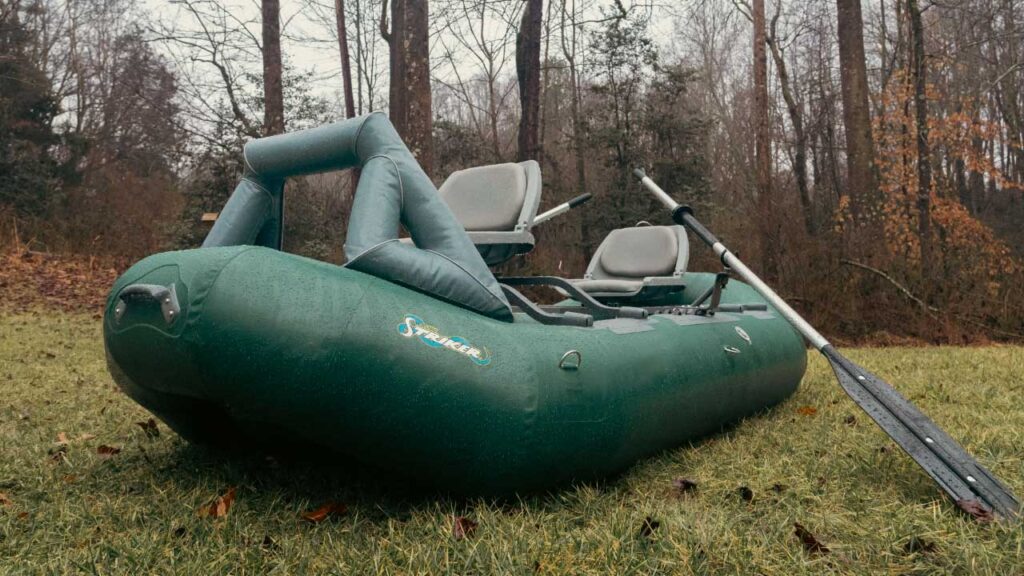
Outcast Striker Specs
At 9’ 5” long and 5’ wide when fully inflated, the Striker will fit in the bed of a standard pick-up truck. When deflated, it can even be hauled in the back of an SUV or the trunk of a car.
In addition, it only weighs 102 pounds, so two anglers can move it around easily even when it’s all rigged up.
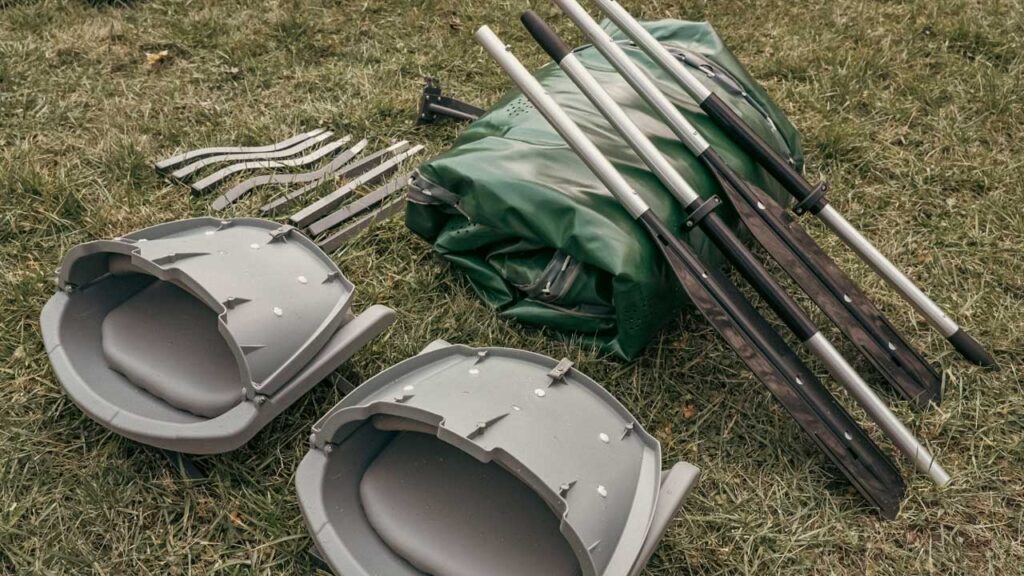
Outcast Striker Assembly Tips
Strikers don’t have frames so they’re easy to put together without tools.
Right off the bat, I liked that the raft came with standard equipment like oars, oarlocks, and seats for the angler and rower. This is a big deal because you don’t need a lot of additional gear to get the boat out on the water in a hurry.
You also get a couple of mounting plates that you can slide into welded pockets on the boat. That said, you do need the addition of whatever accessory you’re mounting to do it. We added the YakAttack Switch to those bases in a couple of places to mount camera gear. This was very easy with the three mounts already included.
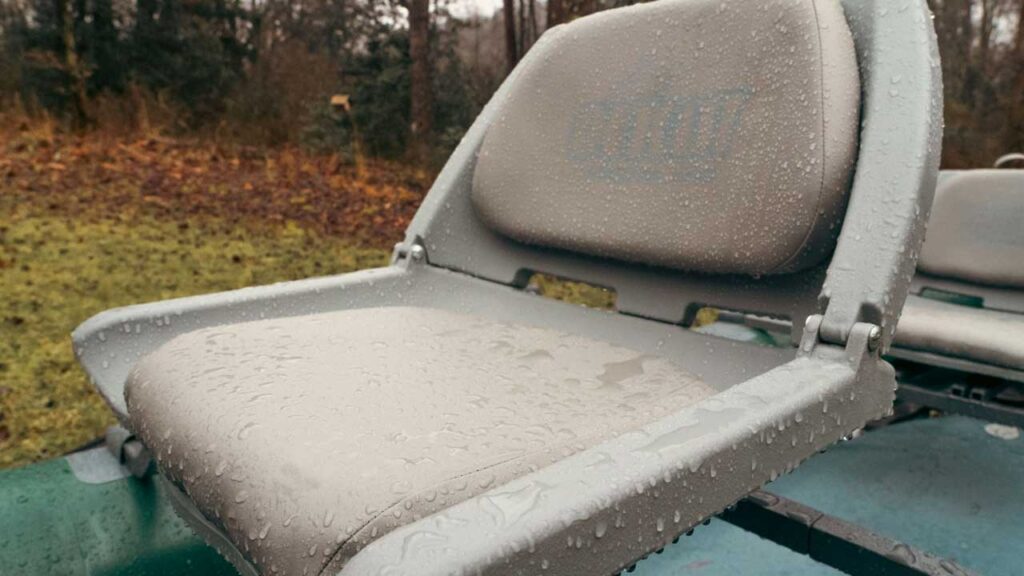
Outcast Striker Seat Configuration
Every fishing raft review has to talk about seats and comfort! The seat mounts slip into slots built right into the boat, and when the raft is inflated the pressure holds them in place. I also liked that both seats are adjustable fore and aft. This allows you to get the cockpit dialed in to fit your particular needs.
Both seats were comfortable, and the front seat swivels so you can cast in any direction. There are also a couple of different places you can mount the seats and oarlocks, so making adjustments is easy even though the raft doesn’t have a frame.
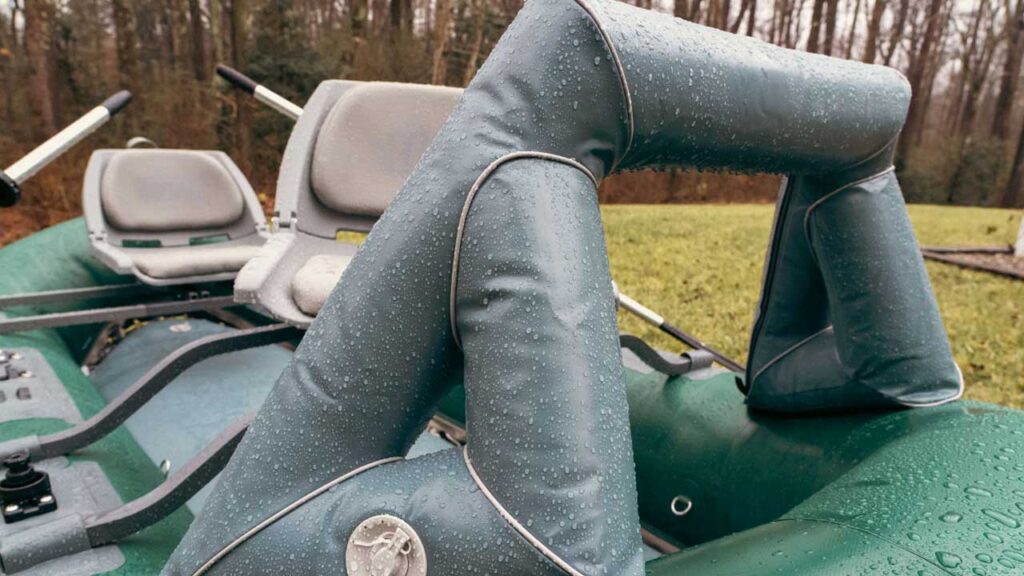
Outcast Striker has an Inflatable Brace for Fishing
The Striker also comes with an inflatable leaning post up front. It gives you a third point of contact so you can stand up in the boat.
When I first saw it I wondered how rigid and stiff it would be out on the water. This is particularly important for me because I weigh 220 pounds. However, it held up under my weight when I leaned all the way into it. Trust me, it’ll give you confidence because you won’t have to worry about falling overboard.
Holding me above water is key to any boat review and Outcast Stricker fishing raft review of stability is two thumbs up!
The boat has a total of three inflatable chambers. One is the leaning post itself, two more are in the side tubes, and the last one is the floor. They can all be inflated to a maximum of 3 PSI.
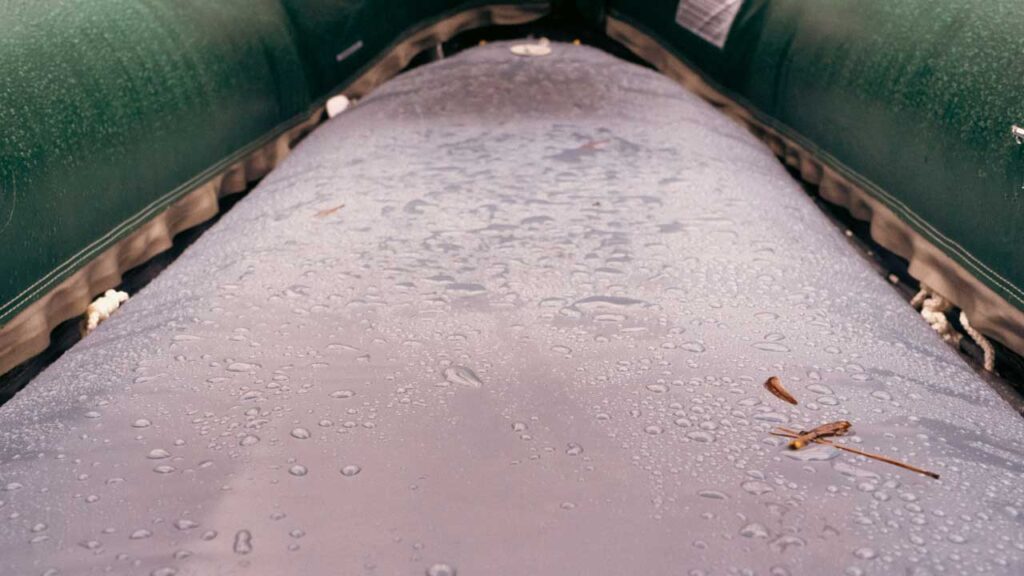
It’s also worth mentioning that the Striker has a self-bailing floor. This is a great feature because even if water does get in, it can escape out the bottom of the raft.
Outcast Striker is Built for River Fishing
Like I said, I’ve been looking for a two-person raft for a while. I want to be able to get out on the water quickly and fish from the same boat with a friend or one of my kids. So I was excited to try out the Striker, which really is made for river fishing.
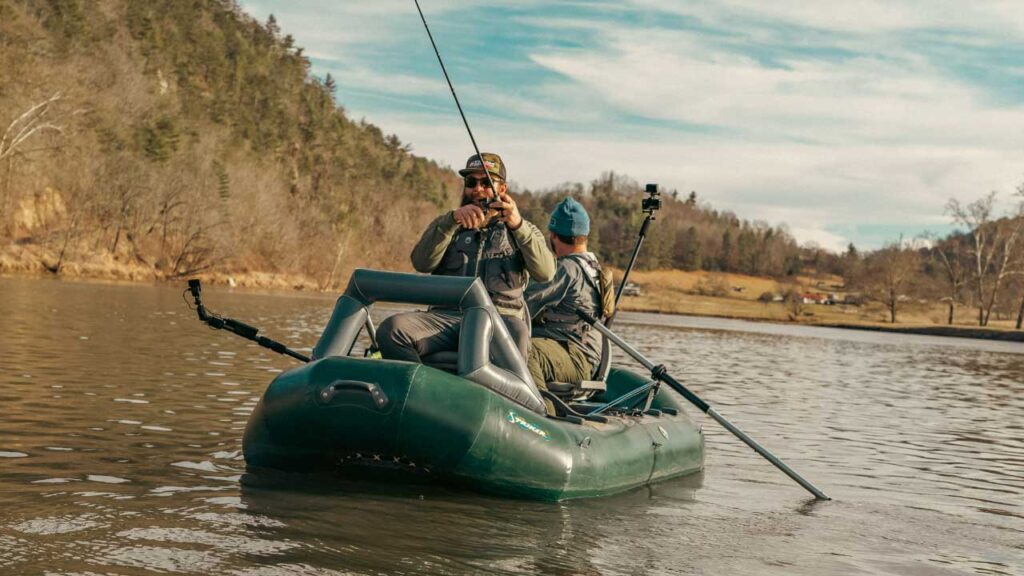
If you're going to be floating down current or even through some moderate rapids this boat will really excel. It’s not something I'm going to use inshore or to cross a big open lake. On the other hand, I think it’ll work well for me because I fish rivers most of the time.
I don’t have a lot of experience with rafts, so it was kind of a learning experience just ordering it online and not knowing exactly what to expect. But again, it was easy to assemble and came with seats, oars, and oarlocks.
Outcast Striker doesn't come with a Pump
But one key thing I thought was missing was some kind of pump. I haven’t mentioned it yet, but the boat cost $3,699. I found a couple of places that sold Strikers online for less than the MSRP of $3,699, but they were all sold out.
At this price point I think a pump should be included. Luckily I was able to use one I already had. If you’ll be inflating and deflating the boat regularly I’d definitely recommend getting an electric pump. It’ll save you tons of time and energy.
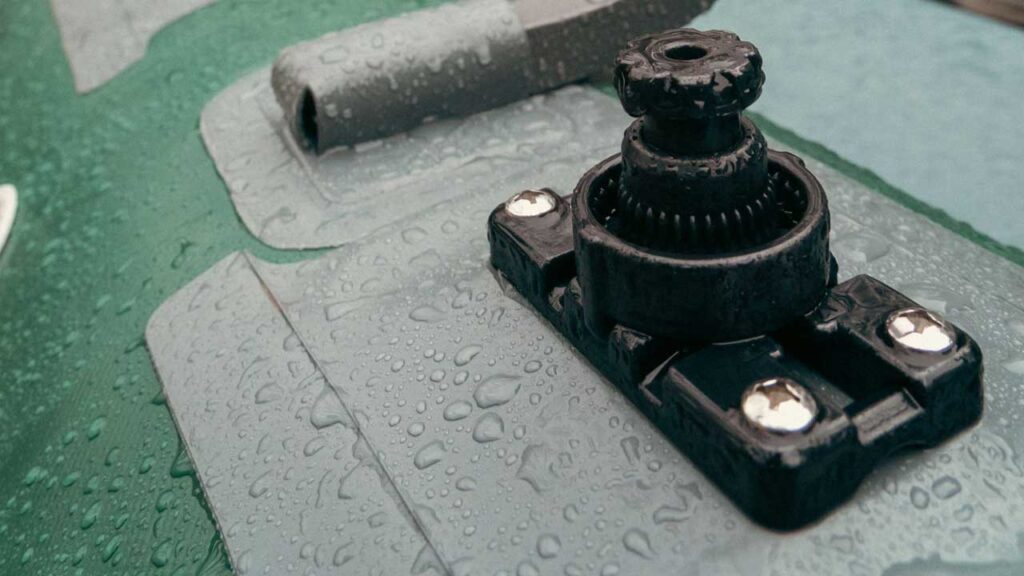
The Mounting Accessories on the Outcast Striker
Another great feature is that the Striker has plenty of mounting options that allow you to add hardware like a GoPro without having to glue anything to the raft. It was also nice that I could move them around quickly, especially with the YakAttack products I added.
If you're not familiar with YakAttack, they make a wide variety of kayak fishing accessories. I’ve spent most of the last decade fishing from kayaks, but it was easy for me to transition these accessories over to the Striker.
Stability and Maneuverability
The Striker felt very light and maneuverable out on the water, and I could easily spin it 180 degrees with one paddle stroke. I also liked knowing that getting it to go where I wanted it to wouldn’t be a problem if I was approaching rapids or whitewater.
At 102 pounds, the Striker is between 30 and 40 pounds lighter than some of the rafts in its class.
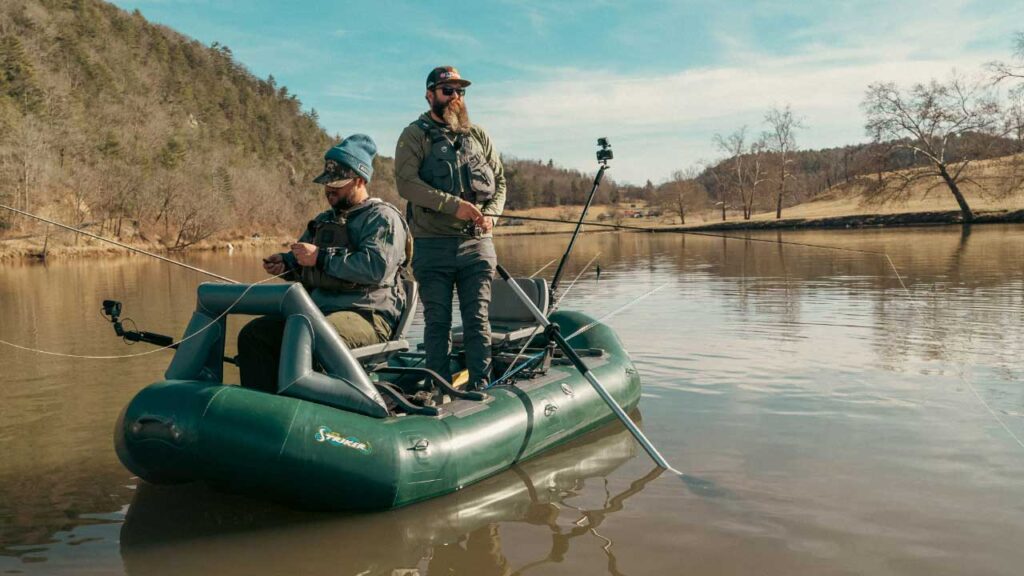
I think this is mostly because it doesn’t have a big frame. However, the flipside is that there is some flex in the seat and the boat in general. The flexing is particularly noticeable when you lean forward or backward, and when you’re getting on the oars pretty hard.
I didn't see it being a big problem, but we tested the boat out in some pretty calm water. Since we were unfamiliar with the Striker, we didn't want to take it out into running water right away.
The Outcast Striker and Fly Fishing
Once we had our sea legs I decided to get up front and give it a try with the fly rod. I didn’t think I’d catch anything, but I wanted to see how snag free everything was when I stripped line and casted.
The boat seemed plenty stable even when I was standing up. I could put most of my weight on one side without feeling like it was going to flip. However, the floor did feel a little squishy and spongy at times. I think this was because it’s only inflated to 3 PSI. I’m not sure how I’d solve this issue. I think it’s just something I’ll have to get used to.
A few times when I put too much weight in one area I noticed water coming in through the self-bailing floor. It did drain back out pretty quickly though, and I think I’ll probably get used to the floor as I use the raft more.
The other thing about the floor is that it can get pretty slick. If you’re not wearing grippy shoes you may move around a little bit on it. I was wearing boots and didn’t have any problems, but it’s definitely something you’ll want to be aware of.
Another thing I noticed was that I could come close to losing my balance if my partner got on the oars when I wasn’t expecting it. In cases like these, the front leaning post comes in very handy.
Anchor System for the Outcast Striker
One of the big things that I really felt was missing from the Striker was an anchor system.
I could rig a usable anchor system pretty easily using the mounting plate directly behind the rower’s seat. So this isn’t a deal breaker, but it’s something I’d have to put some time and effort into before heading out on a serious fishing trip.
Target Audience for the Outcast Striker Fishing Raft?
In my opinion, the Striker is worth considering if you want an easily transportable two-person fishing raft that can be assembled without any tools.
Again, it’s lightweight and can be hauled in the bed of a standard pick-up truck so you don't need a trailer. I also think the Striker would work well if you have limited storage space and will be inflating and deflating it frequently.
On the tradeoff side, it didn’t feel as rigid as some other rafts, and the floor was slippery and spongy at times. These are things I’d have to get used to if I was going to spend a lot of time in the Striker.
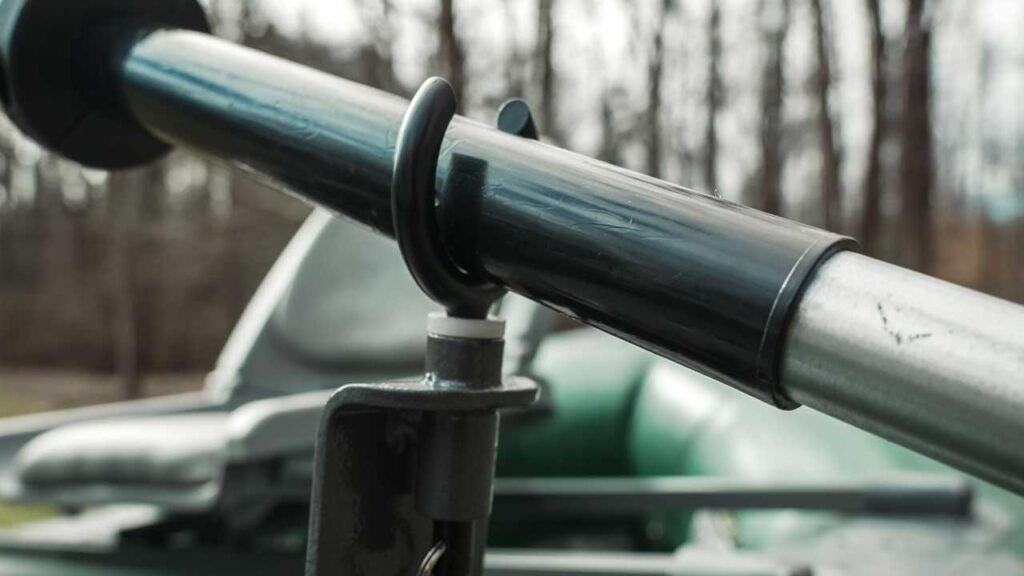
Included vs Upgraded Oars
Another thing I’d look at is oars. I’ve used lots of different oars and paddles over the years, and at higher price points you generally move into graphite, carbon, and fiberglass. The Striker’s oars have aluminum shafts and plastic blades. These are generally heavier and less efficient than more expensive models, but I found that they worked just fine for what we did. I may consider upgrading the oars in the future, but right now it’s not a priority.
At the end of the day, the Striker is definitely a river fishing raft worth checking out.
If you’ve enjoyed my Outcast Stricker fishing raft review, stay tuned, because there are more in the pipeline along with some head-to-head comparison posts that you won’t want to miss.
Follow my Adventures and Subscribe
If you enjoyed this article and are hungry for more adventure fishing tips, tricks, reviews, and adventures? Head on over to the Road Trip Angler YouTube channel and feel free to sign up for our In4Adventure.com newsletter.

Raft: Outcast Striker
Life vest: NRS Chinook PFD
Shirt: NRS Varial Hoodie
Rods: Judge Crankbait Series, Eternity Series, Revelation Series
Sunglasses: WileyX



